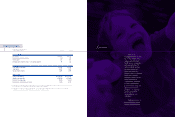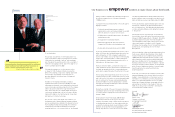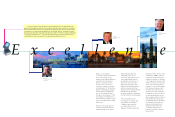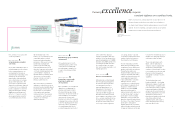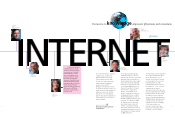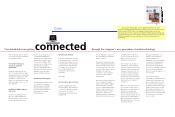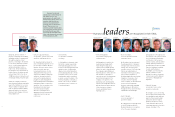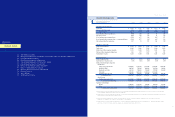Humana 1999 Annual Report Download - page 3
Download and view the complete annual report
Please find page 3 of the 1999 Humana annual report below. You can navigate through the pages in the report by either clicking on the pages listed below, or by using the keyword search tool below to find specific information within the annual report.
2 3
tackling” initiatives undertaken by leadership and supported
by a reborn energy and focus on the part of Humana’s
17,000 associates.
Such positive trends accelerated further in the fourth quarter.
Highlights included:
Continued sequential improvement in adjusted
earnings before a non-cash charge, primarily for goodwill
write-offs and losses on sales of non-core assets;
A 20-basis-point sequential improvement in the adjusted
medical expense ratio;
Strong growth in key Medicare markets;
$234 million adjusted cash flow from operations,
compared to $78 million in the third quarter; and
Double-digit commercial premium yields for 2000.
For the year, Humana reported adjusted net income of $117
million or $.69 per share excluding charges taken in the first
and fourth quarters of 1999, compared to adjusted net
income of $213 million or $1.27 per share in 1998 excluding
charges taken in the third quarter of 1998. Including first-
and fourth-quarter charges, Humana reported a net loss of
$382 million or $2.28 per share in 1999.
Revenues were $10.1 billion, a 3.4 percent increase over
1998's $9.8 billion. Revenue growth in the fourth quarter and
fiscal year was primarily the result of commercial premium
yields, which escalated throughout the latter half of the year.
The increasing commercial premium yield is the result of the
company pricing its products commensurate with cost trends,
and of the success of the sales force in introducing the higher
rates to customers. For the year, commercial membership
declined 177,900 or 5.5 percent, primarily due to attrition
among groups with high medical expense ratios faced with
substantial renewal rate increases.
During the second half of the year, strong sales in Humana’s
key Medicare markets offset early membership attrition in the
31 counties that the company announced it would exit on
January 1, 2000.
We are pleased to report that January 2000 Medicare
membership continued to be strong, not only in the
company’s key markets, many of which saw the introduction
of member premiums, but also in other markets which also
accepted the member premium concept. Medicare member
premiums are an important new pricing paradigm in our
industry. They allow us to offset the effect of lower Health
To our shareholders:
The past year was a difficult one for Humana and for our
investors. Our failure to align our pricing with cost trends in
1998 resulted in our playing “catch up” with inadequate
rates throughout the year. Our results for the second half of
1999 were encouraging, however, and set the stage for our
return to profitable growth in 2000.
Following the resignation of our chief executive officer
on August 3, 1999, the Board of Directors created the
Office of the Chairman, composed of chairman and interim
chief executive officer David A. Jones and senior vice
presidents Michael B. McCallister, James E. Murray and
Kenneth J. Fasola.
The Office of the Chairman immediately created an
organizational structure in which accountability for results
was paramount. Humana's senior leadership then developed
a new vision, purpose and value proposition for the company,
which is discussed in detail in the essay that follows this
letter. At the same time, the company began shoring up its
core business and disposing of its non-core assets, thereby
improving the balance sheet and freeing cash to pay down
debt and invest in Internet technology.
The outcome of these efforts began to be evident in our
third-quarter results. Adjusted earnings (earnings excluding
any non-recurring items as detailed in the Financial Section of
this Annual Report) improved sequentially, the commercial
medical expense trend fell and Humana posted stronger
operating cash flow — the successful result of "blocking and
Our business is to empowermembers to make choices about their health.
Michael B. McCallister
President and Chief Executive Officer
(left)
David A. Jones
Chairman of the Board
(right)
Humana has demonstrated time and again its ability to
respond effectively to changing consumer needs. Becoming a truly
Internet-enabled, customer-centric health plan company is our
answer to what our members and physicians want.
— Michael B. McCallister, President and Chief Executive Officer
“
“
•
•
•
•
•
Care Financing Administration (HCFA) reimbursement rates,
and are helping to create a strong base from which we can
build our Medicare revenues in profitable markets in 2000.
For the year, Humana's adjusted medical expense ratio was
84.8 percent, compared to an adjusted medical expense
ratio of 83.0 percent for 1998. Our adjusted administrative
cost ratio declined by 30 basis points during the fiscal year
to 14.6 percent.
Following an intensive six-month search for a permanent
chief executive officer, the Board of Directors announced on
February 3, 2000, the appointment of Michael B. McCallister
as president and chief executive officer. Mr. McCallister's
senior management team includes, among others, the two
other former members of the Office of the Chairman:
Mr. Murray, chief operating officer of the Health Plan Division,
and Mr. Fasola, chief operating officer of the Small
Group Division.
With new leadership in place and improving pricing and cost
trends, we are optimistic about Humana's future. Health
insurance remains an unconsolidated industry. More than
1,000 health plans nationwide provide coverage to 150
million Americans, and the top nine publicly traded health
plans have only 30 percent of the managed care market.
Humana is well-positioned to renew its tradition of growth
by using its leverage in franchise markets, its strong brands
and its electronic enablement initiatives to increase market
share through same-store growth and small-scale,
targeted acquisitions.
In the essay, we outline how the company is poised to take
maximum advantage of the electronic business revolution,
leading to lower administrative costs and easier access to
information for our members, customers, physicians and
agents. As a sophisticated facilitator of access to quality
medical care, Humana will play an increasingly vital role in
empowering our members to take charge of their own
health. By so doing, we are committed to becoming the
most trusted name in health solutions.
Sincerely,
David A. Jones
Chairman of the Board
and significant shareholder
Michael B. McCallister
President and Chief Executive Officer
and significant shareholder


